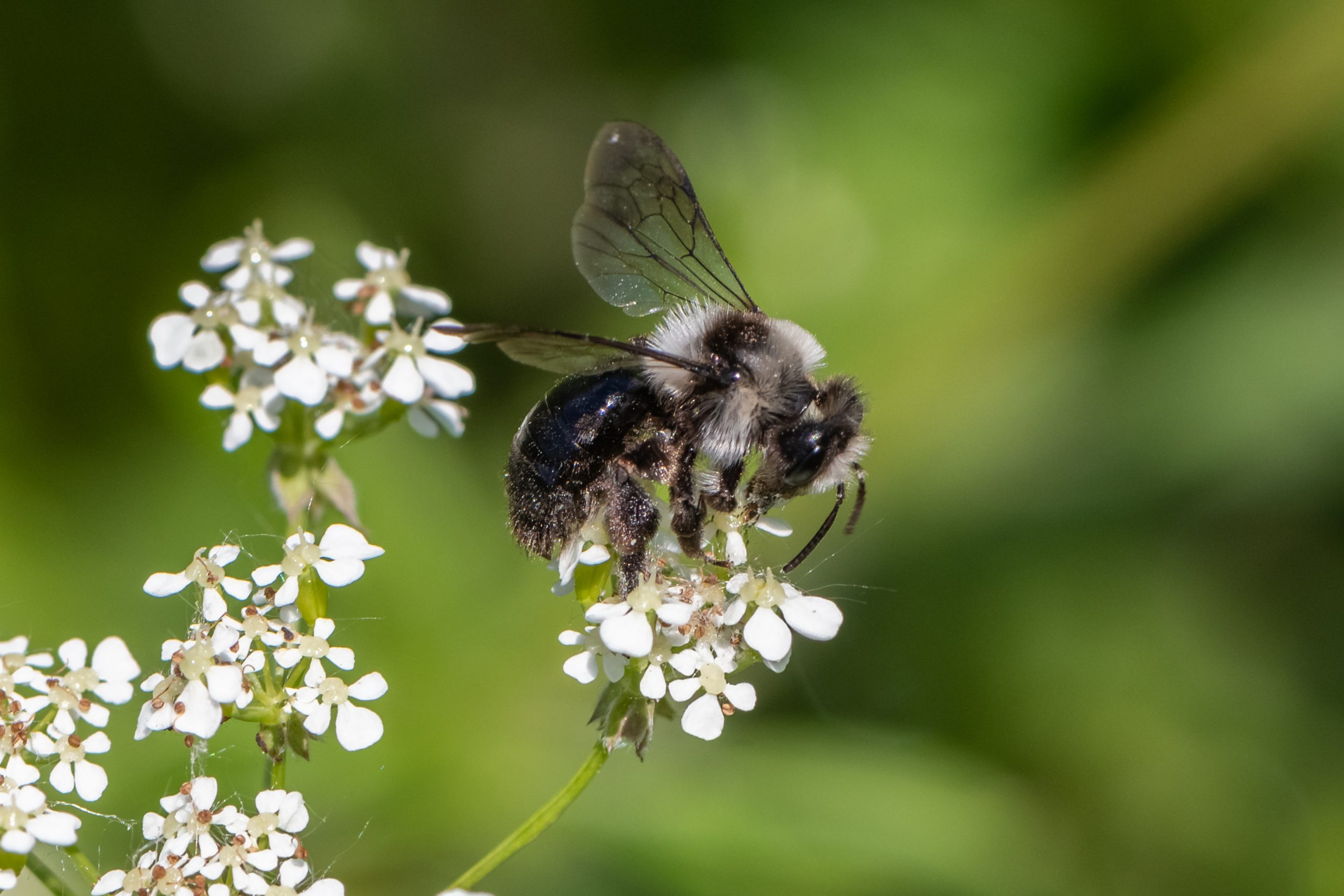The importance of bees, explained

13 April 2022
When a lot of us think of biodiversity, we think of quiet forests or winding streams or a rainforest much further afield.
We may not think of something that’s much harder to spot but that’s just as important: bees.
And if an image of a bee hard at work on a wildflower does come to mind, we’re probably thinking of a European honey bee. But that’s just one bee species out of 100 that have themselves a home here in Ireland.
In fact, most of our bees are solitary bees – and they’re incredibly important.
We wanted to find out more about these vital pollinators, so we did some reading and rang up Trinity College Dublin Professor and Deputy Chair of the All-Ireland Pollinator Plan Jane Stout.
What’s the difference between a honey bee and a solitary bee?
A honey bee is one of the small number of bee species that forms social groups. They’ve got a colony with workers tending to a queen in a hive.
A solitary bee is a species that nests in one place, usually in bare soil when it comes to Ireland, but each female sets up her own nest wherever their home is. They provide food for their larvae, but other than that their offspring are very much left to their own devices.
And as you probably already know – bees across the board in Ireland have been in trouble over the past few decades. Since 1980, more than half of our bee species have seen significant declines and now almost a third of them are considered to be threatened with extinction.
If we dig a bit deeper into those numbers (excuse the soil habitat pun), out of the 77 solitary bee species that find themselves at home here, 24 of them are in serious danger when it comes to extinction threats.
We’re seeing this distressing decline for a couple of reasons. The intensification of agriculture has driven habitat loss and reduced food supply, certain diseases have become more prevalent, there’s the poisoning from pesticides and there’s climate change.
And why are they so important?
Well, first off let’s look at pollination. Bees, including solitary ones, are pollinators, meaning they’re an insect that transfers pollen between plants and flowers to allow fertilisation.
78 per cent of European flowering plant species are dependent on pollination, as are 71 of the 100 crops that provide 90 per cent of the world’s food supply.
And dwindling numbers of bees, particularly the 77 solitary species in Ireland, is a serious threat to that life-sustaining process.
Over roughly the last decade we’ve seen not only a decline in wild bee abundance but also in their diversity, which poses its own whole set of problems, according to Professor Jane Stout.
The more diverse your ecosystems are, the more resilient they are to changes in the climate and land use and to the outbreak of disease. So even if we have lots of honey bees, if we’re just relying on them for pollination, we’re not promoting that diversity.
Different species of bees also take up different tasks in our natural environment. They check in on plants at different times of the year, they touch and move different parts of pollen, which ultimately benefits the ecosystem as a whole.
And zooming out a bit wider, pollinators on the whole are prey for an array of other species. Their decline in numbers has a ripple effect for those who dine on them, so it throws food chains for a loop, too.
Right. So what are the solutions?
Simply put: addressing what’s driving decline.
If we put what they forage on back into the landscape and avoid stressing them with pesticides and other pollutants, there’s a good chance we can restore their numbers.
“We need to work with nature rather than against it,” as Prof Stout succinctly puts it.
And by addressing one corner of the biodiversity crisis, we can also create solutions to the crisis running parallel to it: the climate emergency.
Having a diverse baseline of pollinators means that carbon-dioxide absorbing vegetation gets pollinated, meaning higher bee numbers in itself helps mitigation.
More bees and pollinators around would also mean more prey for those that depend on them for their food supply, like an array of our bird species across the country.
If we had more space for nature that bees could thrive in, that would also mean there would be more beautiful pockets for people to exercise and unwind in.
So while bees shape our own lives in more ways than one, ensuring their well-being would similarly improve our lives and the planet we find ourselves on in a myriad of ways.






